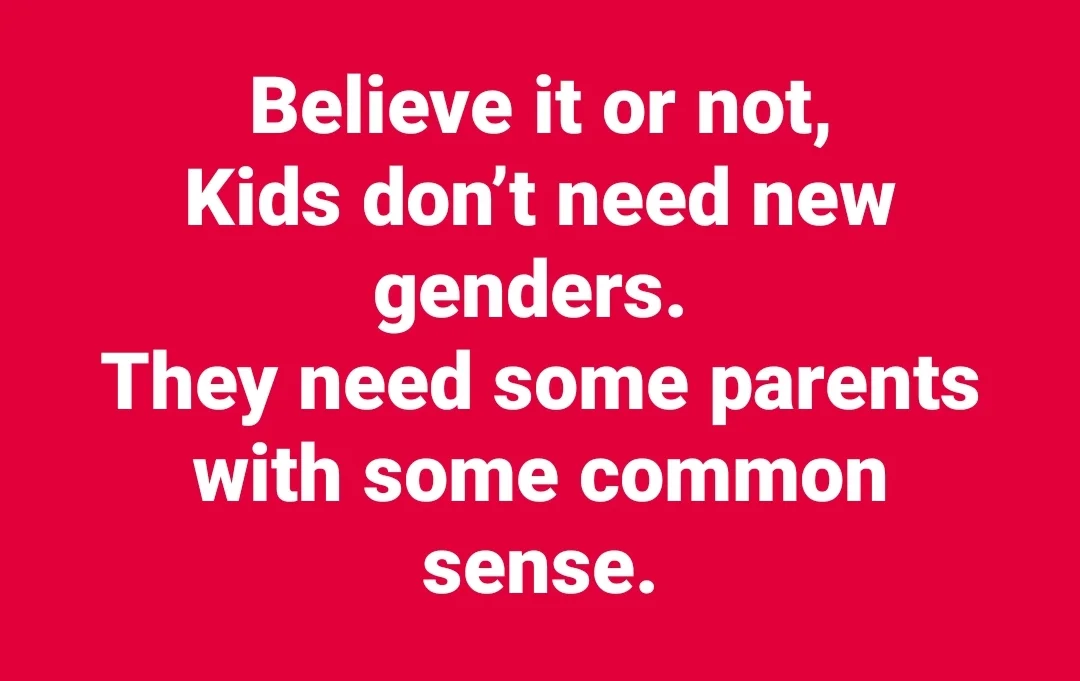
In recent years, a growing cultural conversation has emerged around gender identity, especially when it comes to children. The rise of non-binary identities, gender fluidity, and the idea of self-identification at increasingly younger ages has led to a profound divide in public opinion. A viral image recently circulating on social media captures this division with a blunt statement:
“Believe it or not, kids don’t need new genders. They need some parents with some common sense.”
This bold declaration resonates with a segment of society that believes modern gender discussions have gone too far. But it also ignites intense backlash from those advocating for LGBTQ+ youth, arguing that dismissing gender diversity is not only outdated—it’s harmful. So, what’s really at stake in this debate? Let’s explore both sides of the argument, the data, and where parents should go from here.
The Rise of Gender Diversity Among Youth
Over the last decade, terms like non-binary, genderqueer, agender, and genderfluid have entered mainstream discourse. While many adults still identify strictly as male or female, a growing percentage of young people now describe their gender outside the traditional binary.
A 2022 Gallup poll showed that 1 in 5 Gen Z adults in the U.S. identify as LGBTQ+, and among them, an increasing number report non-binary or transgender identities. Organizations like the American Academy of Pediatrics (AAP) have publicly supported gender-affirming care and inclusive environments for children who express gender diversity.
Proponents argue that recognizing and affirming a child’s gender identity—even at a young age—can significantly reduce risks of depression, anxiety, and suicide. From this perspective, the expansion of gender categories isn’t “confusing children” but validating and protecting them.
The “Common Sense” Argument
However, not everyone is on board.
Critics argue that children are too young to make decisions about gender that could have long-lasting effects on their mental, emotional, and physical well-being. The term “common sense” in the viral quote reflects a belief that traditional parenting wisdom is being overridden by social trends and ideology.
From this view, gender fluidity is seen not as a natural expression but as a form of confusion exacerbated by social media, activist education, and political correctness. Detractors also worry that medical or social transition at a young age could be premature, irreversible, or regrettable later in life.
Some child psychologists, while not denying gender dysphoria exists, caution that more research is needed before making broad policy or parenting decisions based on current trends.
Where Science and Politics Collide
What complicates the issue is the increasing politicization of gender identity in schools, sports, and even healthcare. Laws across the U.S. vary significantly. Some states have passed legislation supporting gender-affirming care, while others have banned it outright for minors. These legal battles have turned personal family decisions into national political flashpoints.
Supporters of gender diversity see opposition as a form of transphobia or ignorance. Critics see their own stance as defending children from unproven ideology. This rift has made productive conversations increasingly difficult.
The Role of Parents: Navigators or Gatekeepers?
Regardless of political stance, parents play the most important role in a child’s development—including their understanding of identity. The core question is this: Should parents affirm every feeling a child expresses, or should they set boundaries based on what they believe is best for their child’s future?
Some parenting experts advise a balance between listening and guiding. That means being open to conversations about gender without rushing to label or medicalize a child. Others believe strongly that affirmation is the only ethical approach, especially if a child is experiencing distress around their gender.
But it’s clear: Blanket slogans—whether “Kids need more genders” or “They just need common sense”—fail to capture the nuance needed in real-world parenting.
Toward Compassionate, Informed Parenting
Rather than reducing complex issues to soundbites, families and communities need safe spaces for dialogue—spaces that prioritize science, compassion, and real-life experience over ideology.
Whether you believe that gender should be fixed or fluid, the truth is: Kids need love, guidance, and truth. They need parents who can listen without panic, guide without judgment, and protect without controlling. And yes, they need common sense—but one that is informed by empathy and up-to-date research, not fear or outdated assumptions.






